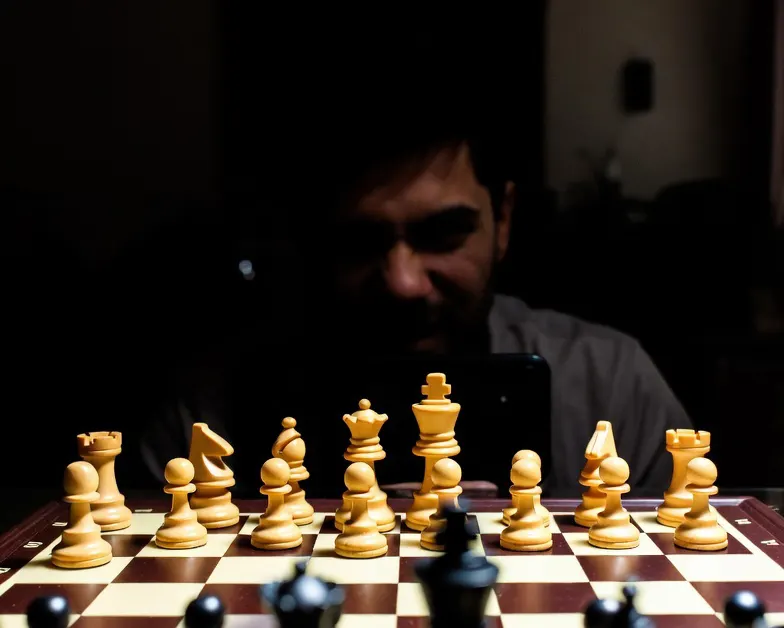Cheating in chess scandal stories have become some of the most dramatic moments in modern chess. While the game is built on trust, psychology, and sportsmanship, technology has created new ways for players to break the rules. From hidden phones in bathrooms to online engine assistance, the chess world has seen several high-profile cases involving Grandmasters, rising stars, and even national teams.
Below are 10 of the most famous top-level cheating scandals—what happened, how it was discovered, and how each case changed the sport.
The 10 Cheating Scandals
1. The French Team Scandal — 2010 Chess Olympiad
One of the earliest and most shocking cases occurred at the 2010 Olympiad in Khanty-Mansiysk.
Three French players were implicated in a coordinated signaling system:
- A player at home analyzed moves using a computer program
- He sent suggestions by SMS to the team coach
- The coach signaled moves using pre-arranged body positions
- The moves were intended for GM Sébastien Feller
FIDE later issued multi-year bans to all involved. Because all three were legitimate titled players, the scandal shook trust in elite-level competition.
2. “Toiletgate” — 2006 World Championship Match
The Kramnik–Topalov match in Elista produced one of the most famous controversies in chess history.
Topalov’s team accused Vladimir Kramnik of taking too many private bathroom breaks, alleging engine consultation.
No proof was ever found, but the accusation led to:
- A forfeited game
- Protests and counter-protests
- A long-lasting rift between the two camps
Though not proven, Toiletgate remains a defining cheating in chess scandal moment that forced FIDE to rethink match regulations.
3. Borislav Ivanov — Mysterious Rise (2012–2013)
Bulgarian player Borislav Ivanov posted a series of surprising victories that matched engine moves at a statistically improbable level.
Suspicion grew after several tournaments, especially when Ivanov:
- Declined to remove his shoes for inspection
- Refused cooperation with organizers
- Had repeated incidents across events
He was eventually banned by the Bulgarian Chess Federation. The case helped push statistical analysis to the forefront of anti-cheating methods.
4. Wesley Vermeulen — Phone in the Restroom (2014)
At the 2014 Iasi Open, Dutch player Wesley Vermeulen was directly caught consulting a mobile phone in the bathroom.
He admitted the offense immediately and received a one-year ban from both FIDE and the Dutch Chess Federation.
This case became an example of clear and undeniable tournament cheating.
5. Gaioz Nigalidze — Smartphone Hidden in a Bathroom (2015)
Georgian GM Gaioz Nigalidze was caught at the Dubai Open with a smartphone hidden inside the restroom stall.
Officials discovered the device running a chess engine with his current game on the screen.
Consequences included:
- A three-year competition ban
- Loss of his Grandmaster title (he retained the IM title)
This became one of the most widely discussed moments of the decade.
6. Sergey Aslanov — Hidden Phone Under a Tile (2016)
At the Moscow Open, Aslanov was expelled after a smartphone was found concealed behind a loose bathroom tile.
He admitted his mistake and received a one-year suspension.
The case highlighted how far some players would go to hide electronic assistance.
7. Igors Rausis — Photographed Using a Phone (2019)
Veteran Grandmaster Igors Rausis was caught after organizers photographed him using a phone in a restroom during a tournament in Strasbourg.
He immediately confessed and retired.
FIDE later:
- Stripped him of his Grandmaster title
- Banned him from official competitions
This was one of the clearest top-level cheating incidents ever recorded.
8. Tigran L. Petrosian — PRO Chess League Ban (2020)
During the 2020 PRO Chess League on Chess.com, Wesley So accused Tigran L. Petrosian of using engine assistance.
Chess.com’s fair-play team investigated and concluded rules had been violated.
As a result:
- Petrosian received a lifetime ban from Chess.com
- His team, the Armenia Eagles, was disqualified
- The Saint Louis Arch Bishops were declared champions
This case showed that online events could carry consequences just as serious as over-the-board tournaments.
9. Dadang Subur (“Dewa Kipas”) — Indonesia’s Viral Controversy (2021)
This scandal became a massive social media phenomenon.
After IM Levy Rozman flagged suspicious engine-like play from an online account belonging to Dadang Subur, the story went viral in Indonesia.
A follow-up exhibition match between Subur and IM Irene Sukandar:
- Reached over 1.25 million live viewers
- Ended with Subur scoring far below engine-level accuracy
- Helped calm public debate around the accusation
This case highlighted widespread misunderstandings about online anti-cheating systems.
10. Magnus Carlsen vs. Hans Niemann — The 2022–2023 Mega Scandal
The biggest cheating scandal in modern history began when World Champion Magnus Carlsen withdrew from the 2022 Sinquefield Cup after losing to Hans Niemann.
Carlsen later stated he believed Niemann had cheated more often than admitted.
Chess.com published a detailed report claiming:
- Niemann had cheated in over 100 online games
- Some games involved prize money
- Niemann had previously admitted to certain incidents
Niemann sued Carlsen, Chess.com, and others for $100 million, but the lawsuit was dismissed in 2023.
The controversy led to major discussions about transparency, fair-play standards, and legal boundaries in chess.
How These Scandals Changed Chess
Across these ten cases, the chess world has adapted by:
- Adding metal detectors and scanners
- Creating dedicated fair-play teams
- Using advanced statistical models
- Implementing stricter restroom policies
- Increasing security at top tournaments
- Enhancing online cheat detection
Cheating cases continue to shape both over-the-board and online regulations, reminding players and organizers how fragile fair competition can be in the age of powerful engines.

I’m a passionate board game enthusiast and a skilled player in chess, xiangqi and Go. Words for Attacking Chess since 2023. Ping me at Lichess for a game or chat.

